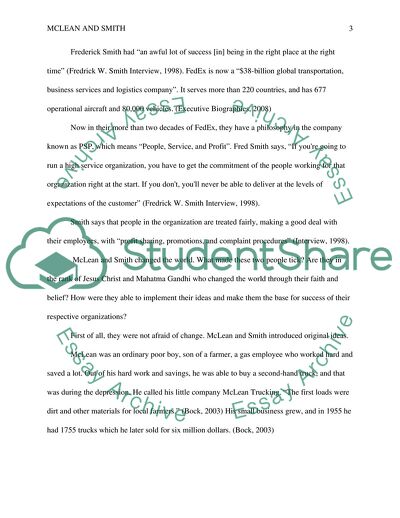
- Home
- Free Samples
- Premium Essays
- Editing Services
- Extra Tools
- Essay Writing Help
- About Us
- Studentshare
- Subjects
- Miscellaneous
- Compare Malcom McLean and the historical significance of the converted tanker Ideal X to the founder of Federal Express, Fred Smith
Compare Malcom McLean and the historical significance of the converted tanker Ideal X to the founder of Federal Express, Fred Smith - Essay Example

- Subject: Miscellaneous
- Type: Essay
- Level: Undergraduate
- Pages: 4 (1000 words)
- Downloads: 0
- Author: emardeula
Extract of sample "Compare Malcom McLean and the historical significance of the converted tanker Ideal X to the founder of Federal Express, Fred Smith"
er and his ‘cohorts’ in Silicon Valley; but they had ideas and were willing to work hard and make a lot of sacrifices for the success of their ideas. McLean and Smith were not only concerned of their own successes, and for the money and fame that they could get out of their feats, but for the people who belonged to their organization and whose families’ survival depended a lot on them. Malcolm McLean, a man who changed the world (Bock, 2003), named his first ship containing 58 35-feet containers “Ideal X” (First Container Ship, 2008).
He was “a trucking magnate who saw the tremendous potential of containerization, particularly in terms of loading and unloading costs” (First Container Ship, 2008). Mayo & Nohria (2005) call McLean “the truck driver who reinvented shipping” and whose feat has been compared to Robert Fulton, the father of steam engine. Frederick Smith had “an awful lot of success [in] being in the right place at the right time” (Fredrick W. Smith Interview, 1998). FedEx is now a “$38-billion global transportation, business services and logistics company”.
It serves more than 220 countries, and has 677 operational aircraft and 80,000 vehicles. (Executive Biographies, 2008) Now in their more than two decades of FedEx, they have a philosophy in the company known as PSP, which means “People, Service, and Profit”. Fred Smith says, “If youre going to run a high service organization, you have to get the commitment of the people working for that organization right at the start. If you dont, youll never be able to deliver at the levels of expectations of the customer” (Fredrick W.
Smith Interview, 1998). McLean and Smith changed the world. What made these two people tick? Are they in the rank of Jesus Christ and Mahatma Gandhi who changed the world through their faith and belief? How were they able to implement their ideas and make them the base for success of their respective organizations? McLean was an ordinary poor
...Download file to see next pages Read MoreCHECK THESE SAMPLES OF Compare Malcom McLean and the historical significance of the converted tanker Ideal X to the founder of Federal Express, Fred Smith
Federal Express
Autobiography of Malcom x
Autobiography of Malcolm X
Brief History of Malcom X
Federal Express - FedEx Corporation
The Biography of Malcom X
Executing Strategies in a Global Environment: Examining the Case of Federal Express
Strategic Management and Leadership: Federal Express

- TERMS & CONDITIONS
- PRIVACY POLICY
- COOKIES POLICY